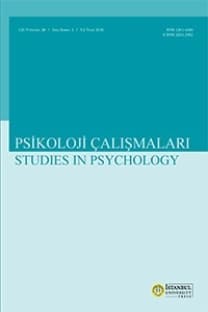48-72 Ay Arası Anaokulu Çocuklarının Üstbilişsel Kararlarının ve Motor Performanslarına İlişkin Kararlarının Karşılaştırılması
Küçük çocukların üstbilişsel kararları ve fiziksel performanslarına ilişkin tahminleri üzerine yürütülmüş araştırmalar çocukların kendi performanslarını abartılı tahmin etme eğiliminde olduklarını göstermektedir. Bu çalışmada 48-72 ay arası anaokulu çocuklarının motor performanslarına ilişkin kararları ile üstbilişsel kararlardan öğrenme kararı ve bilme hissi kararlarının karşılaştırılması amaçlanmıştır. Bulgular motor performans kararlarının doğruluğunun öğrenme kararlarının doğruluğuna göre daha yüksek olduğunu göstermiştir. Çocukların bilme hissi kararları ile motor performans hislerinin doğruluğu arasındaki farklılaşma ise yalnızca bir motor görev için anlamlı bulunmuştur. Çocukların öğrenme kararları ve bilme hissi kararları arasında ve her bir motor görevin performans kararı ve performans hissinin doğruluğu arasında anlamlı farklılaşma olduğu, görevlere ilişkin performans hislerinin daha isabetli olduğu bulunmuştur. Çocukların üstbilişsel kararlarının ve motor görevlere dair kararlarının doğruluğu yaş grupları arasında farklılaşma göstermemiştir.
Anahtar Kelimeler:
Üstbilişsel kararlar, öğrenme kararı, bilme hissi kararı, fiziksel görev, motor görev
Comparison of Metacognitive Judgments and Judgments about Motor Performance of Preschoolers Between 48-72 Months
Research on young children’s predictions regarding metacognitive and physical performance has shown that they tend to overestimate their performance. This study aims to compare the accuracy of judgments of learning and feeling of knowing with judgments of motor performance in preschoolers aged between 48 and 72 months. Results show that children’s judgment of their motor performance is more accurate than their judgment of learning. The difference between children’s feeling of knowing and their feeling of motor performance is present only in one motor task. A significant difference between the accuracy of children’s judgments of learning and feeling of knowing was found. It was also observed that there is a significant difference between the judgment of motor performance and feeling of motor performance in each motor task, i.e., children’s feeling of motor performance was more accurate. The accuracy of children’s metacognitive judgment and motor task judgment, however, was not different between different age groups.
Keywords:
judgment of learning feeling of knowing, physical task, motor task, Metacognitive judgments, motor task,
___
- Cunningham, J. G., & Weaver, S. L. (1989). Young children’s knowledge of their memory span: Effects of task and experience. Journal of Experimental Child Psychology, 48, 32–44.
- Dunlosky, J., & Metcalfe, J. (2009). Metacognition. California, CA: Sage.
- Flavell, J. H. (1971). First discussant’s comments: What is memory development the development of? Human Development, 14(4), 272–278.
- Flavell, J. H. (1979). Metacognition and cognitive monitoring: A new area of cognitive–developmental inquiry. American PsychologistP, 34(10), 906–911.
- Karslı, Y. (2015). Bilişsel esneklik, iki dillilik ve üstbilişsel kararlar arasındaki gelişimsel bağlantılar. (Yüksek Lisans Tezi). YLT İstanbul Üniversitesi Sosyal Bilimler Enstitüsü, İstanbul.
- Lipko-Speed, A. R. (2013). Can young children be more accurate predictors of their recall performance? Journal of Experimental Child Psychology, 114, 357–363.
- Lipko, A. R., Dunlosky, J., & Merriman, W. E. (2009). Persistent overconfidence despite practice: The role of task experience in preschoolers’ recall predictions. Journal of Experimental Child Psychology, 103(2), 152–166.
- Nelson, T. O., & Narens, L. (1990). Metamemory: A theoretical framework and new findings. The Psychology of Learning and Motivation, 26, 125–173.
- Nelson, T. O., & Narens, L. (1996). Why investigate metacognition. In J. Metcalfe & A. P. Shimamura (Eds.), Metacognition: Knowing about knowing (pppp. 1–25). Cambridge, UK: The MIT Press.
- Plumert, J. M. (1995). Relations between children’s overestimation of their physical abilities and accident proneness. Developmental Psychology, 31, 866–876.
- Plumert, J. M., & Schwebel, D. C. (1997). Social and temperamental influences on children’s overestimation of their physical abilities: Links to accidental injuries. Journal of Experimental Child Psychology, 67, 317–337.
- Schneider, W. (1998). Performance prediction in young children: Effects of skill, metacognition and wishful thinking. Developmental Science, 1(2), 291–297.
- Schneider, W., Visé, M., Lockl, K., & Nelson, T. O. (2000). Developmental trends in children’s memory monitoring: Evidence from a judgment-of-learning task. Cognitive Development, 15(2), 115–134.
- Schneider, W., & Lockl, K. (2002). The development of metacognitive knowledge in children and adolescents. In T. J. Perfect &and B. L. Schwartz (Eds.), Applied metacognition (pppp. 224–257). Cambridge, UK: Cambridge University Press.
- Schraw, G. (2009). Measuring metacognitive judgments. In D. J. Hacker, J. Dunlosky & A. C. Graesser (Eds.), Handbook of metacognition in education (pppp. 415–429). New York, NY: Routledge..
- Shin, H., Bjorklund, D. F., & Beck, E. F. (2007). The adaptive nature of children’s overestimation in a strategic memory task. Cognitive Development, 22, 197–212.
- Stipek, D. J., Roberts, T. A., & Sanborn, M. E. (1984). Preschool-age children’s performance expectations for themselves and another child as a function of the incentive value of success and the salience of past performance. Child Development, 55(6), 1983–1989.
- Tekcan, A. İ. ve Göz, İ. (2005). Türkçe kelime normları. İstanbul: Boğaziçi Üniversitesi Yayınevi.
- ISSN: 1304-4680
- Başlangıç: 1956
- Yayıncı: İstanbul Üniversitesi
